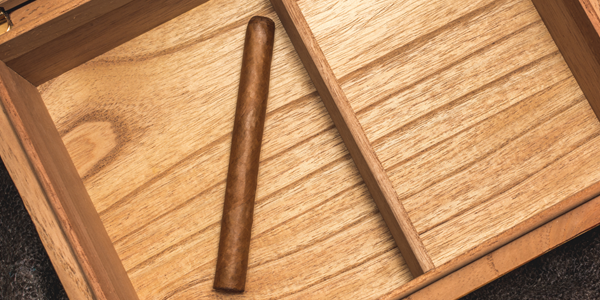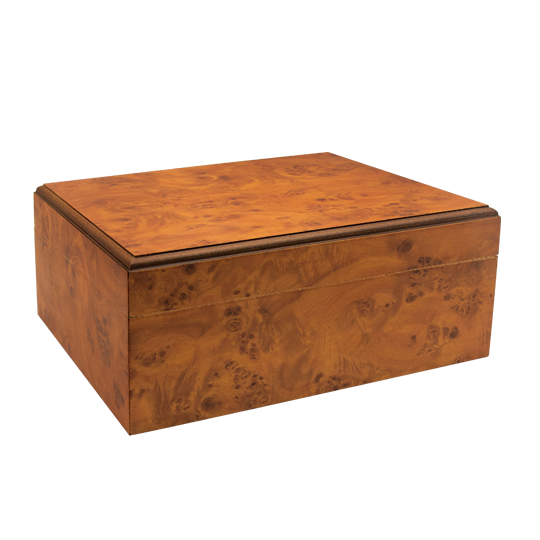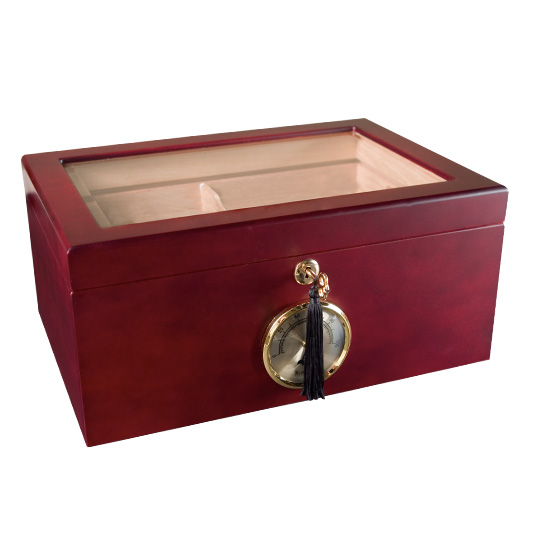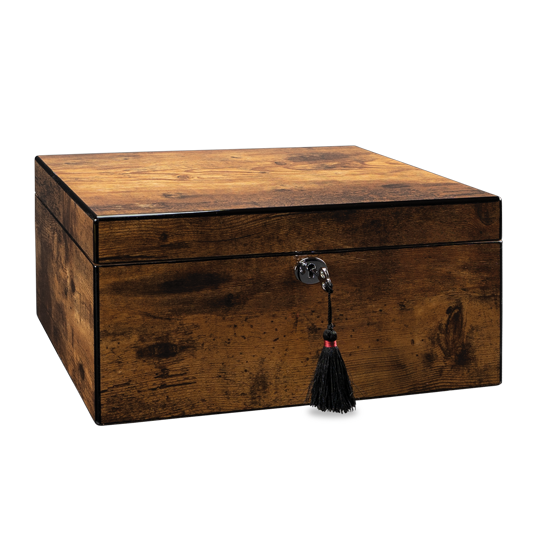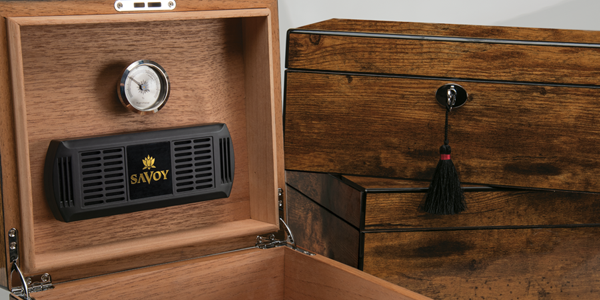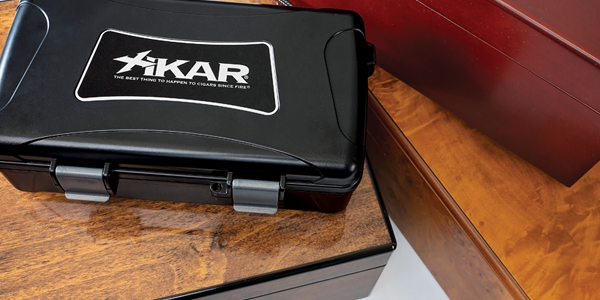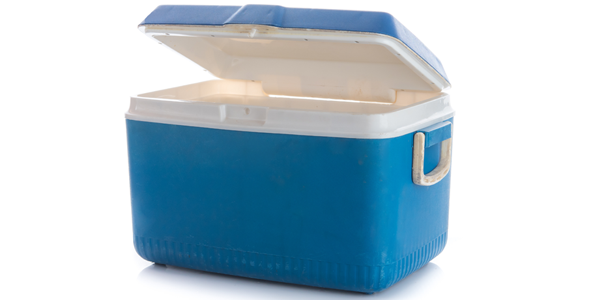Humidor Wood
If you’ve ever shopped for a humidor in a retail store with a decent selection, you may have noticed a meaningful disparity in the materials, weight, construction, and price of the boxes for sale. Premium handmade cigars should be stored at 70% RH (relative humidity) and 70 degrees Fahrenheit. Humidors are built to maintain these conditions for your cigars. Arm yourself with a bit of knowledge to choose the best humidor for your needs.
Spanish cedar is the best wood for a cigar humidor, but it’s also the most expensive. Most wooden humidors are either cedar lined or constructed entirely of Spanish cedar hardwood, except for the exterior veneer. Traditional wooden humidors range in price from around $30 to several hundred or even thousands of dollars. Here’s an overview of humidors based on the materials they’re made from and what you can get within your budget.
What Is Spanish Cedar?
Spanish cedar, or Cedrela Odorata, meaning “fragrant cedar” in Latin, actually comes from Brazil and is a genus of the mahogany tree. Actual cedar trees are evergreen and never shed their leaves. Spanish cedar, however, is a deciduous tree that sheds its leaves during the dry winter season. They grow as high as ninety feet and are coated in a corrugated gray bark. The wood became known as Spanish cedar due to its discovery and widespread use by Spanish conquistadors who built their churches with it hundreds of years ago.
Why Spanish Cedar Humidors Are Best
Authentic Spanish cedar humidors start in the hundreds of dollars and can go well above that. Humidors built to last a lifetime, like Savoy Executive (starting around $250) and Elie Bleu (starting around $1500) are made from one-hundred percent Spanish cedar, excluding the exterior veneer. Savoy Executive humidors offer the highest performance and longevity for the best value. Elie Bleu humidors are handcrafted from kiln-fired Spanish cedar in a small boutique in Paris. They are made by master artisans and are considered works of art due to their meticulous and stunning finishes.
Spanish cedar is the best wood for humidifying cigars for the following reasons:
1. Maintaining Consistent Humidity and Temperature
Spanish cedar does not warp, weaken, rot, or crack when exposed to moisture and fluctuating temperatures over time, like many other woods. Spanish cedar humidors can absorb a phenomenal amount of humidity without impacting the integrity of their construction. After a Spanish cedar humidor has been seasoned, the wood swells and the seal tightens creating a sound and consistent environment for your cigars. Solid Spanish cedar boxes are made with interlocking joints, sturdy hinges to support the heavier weight of the lid, and aggressive humidification systems guaranteed to maintain a consistent humidity for your cigars.
2. Improving the Flavor of Cigars as They Age
Spanish cedar will not only keep your cigars fresh, but they will taste better as they age. Because Spanish cedar reacts positively with the oils in premium tobaccos, it preserves their natural taste and encourages their flavors to evolve over time. Although empty cigar boxes do not function as humidors, most are made from a lightweight cedar to protect them and to support the aging process.
3. Preventing an Outbreak of Cigar Beetles
Spanish cedar can prevent against an outbreak of cigar beetles, which can occur when the humidity and temperature reach a point where their eggs can hatch. Tobacco beetles and termites are deterred by the piney, fragrant aroma Spanish cedar emits.
Inexpensive Cedar-Lined Humidors
The best humidors for beginners are inexpensive – under $100. The Artisan Champagne is one of the most popular and affordable humidors for new cigar lovers. This basic humidor holds 25 cigars and is made from lightweight wood with a thin cedar lining on the interior, and it comes with a moveable divider and a simple humidification puck that mounts to the top of the lid. For under $30, you can choose a darker veneer with the Artisan Hamilton or a leather-like finish in the Artisan Outlaw. Artisan humidors are well made, but they are economical and are crafted for cigar lovers on a budget. They get the job done, but are not designed to last for decades.
Starting around $60, the Rochester Cherrywood and Rochester Glass Top humidors are very popular. These are a step up from the Artisan brand because the interior hardwood is thicker as is the cedar lining. The hinges are heavier to support the heavier weight of the lid, and they come with a larger humidification unit and an analog hygrometer.
The Savoy brand offers the greatest number of options when you’re looking for the best quality at the best price. Dozens of traditional and exotic finishes are crafted in small (25 cigars), medium (50 cigars), and large capacity (100 cigars) sizes. Savoy humidors start around $80 and are equipped with a moveable divider, reliable humidification unit, and an analog hygrometer. A wide variety of finishes like the Mesquite, Rosewood, and Macassar look awesome and perform wonderfully without costing a fortune. Plus, they are made from thicker, more resilient woods than your typical entry-level humidor.
Alternative Wood for Humidors
Other kinds of woods used to make humidors include American red cedar and Honduran mahogany. In most cases, these humidors are still lined with a cedar veneer on the inside. Generally, thicker, heavier hardwood boxes will maintain their integrity longer as they react with and absorb moisture. A cedar lining imparts the positive attributes of Spanish cedar but at a lower cost than a solid cedar box.
Non-Wood Humidors
There are also numerous alternatives to traditional wooden humidors. The most common is the coolidor (or coolerdor), which simply involves humidifying a cooler and storing your cigars inside. Some aficionados prefer a glass top humidor versus solid wood because they want to see their cigars without having to lift the lid. Many cigar lovers have made other DIY humidors by converting Tupperware, wine refrigerators, and even Mason jars into humidified compartments for their cigars. Some do it to save money, others make their own humidors because they’ve run out of space in their main humidor. There is an even smaller group who will build a walk-in humidor in their home. The one thing almost all of these alternative methods share is that Spanish cedar is recommended for the shelves or any interior dividers between the rows of cigars. You can save the cedar sheets from cigar boxes and layer them between your cigars to encourage aging and improve the flavor when you store your cigars in a coolerdor or Tupperware, for example.
Shop our selection of cigar humidors when you’re narrowing down the best box to meet your needs. We’ve got several traditional and exotic finishes to consider in small, medium, and larger sizes.

